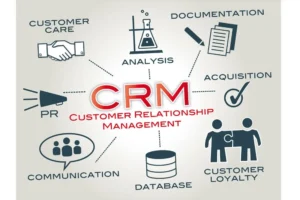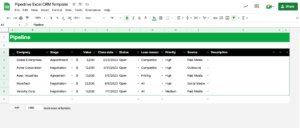Imagine having a personal assistant dedicated to managing your customer relationships, organizing your sales pipeline, and delivering valuable insights at your fingertips. That’s the power of a well-chosen CRM system. In this blog post, we will guide you through the process of choosing the ideal CRM system for your business needs.
We’ll explore factors such as functionality, scalability, and cost to help you make an informed decision that aligns with your specific requirements. Say goodbye to manual data entry and hello to a smarter way of doing business!
Understanding CRM Systems:

CRM, or Customer Relationship Management, is a software solution designed to help businesses effectively manage customer interactions and relationships.
Implementing a CRM system has many benefits, including improved customer satisfaction, enhanced sales and marketing efforts, and better overall organizational efficiency.
A CRM system empowers businesses to make data-driven decisions and deliver personalized experiences to their customers by centralizing customer data, automating tasks, and providing valuable insights.
Assessing Your Business Needs:
Before exploring CRM systems, it’s crucial to assess your business needs and understand how a CRM can address your pain points and goals. Take a moment to identify the areas where a CRM system can impact your business most.
Are you struggling with managing leads and sales opportunities? Do you need better customer support and service management? Are you looking to improve marketing campaigns and customer segmentation?
By identifying these key areas, you can narrow your search and focus on CRM systems that offer functionalities that align with your specific requirements. Choosing a CRM system that can grow and evolve with your business is essential, providing a solid foundation for long-term success.
Functionality Considerations
Functionality is a critical factor to consider when evaluating CRM systems. Each business has unique needs, so it’s important to identify the key features and capabilities essential for your operations.
Common CRM functionalities include contact management, lead and opportunity tracking, email integration, task automation, reporting, and analytics. Evaluate your business processes and workflows to determine which functionalities are crucial for improving efficiency and achieving your goals.
Additionally, consider how customizable the CRM system is to tailor it to your requirements. A flexible CRM solution that can adapt to your workflows will provide a seamless experience for your team and enhance productivity.
Scalability and Future Growth
Selecting a CRM system that can accommodate your business’s growth is essential to avoid outgrowing your software and facing migration challenges down the line. Look for a CRM system that offers scalability by considering factors such as user capacity, data storage, and expansion options.
Ensure that the CRM system can handle an increasing volume of customer data and can support additional users as your team expands. A scalable CRM solution will save you time and resources in the future, enabling you to focus on your business growth rather than dealing with software limitations.
Cost Analysis
While cost should not be the sole determining factor, it is important when choosing a CRM system. Evaluate the pricing models and plans offered by CRM vendors to understand the total cost of ownership.
Consider factors such as subscription fees, implementation costs, maintenance charges, and additional fees for integrations or customization. It’s essential to balance cost and value by choosing a CRM system that aligns with your budget while meeting your business needs.
Investing in a robust CRM system that delivers tangible results can lead to long-term cost savings and revenue growth.
Researching CRM Vendors

Researching and evaluating CRM vendors is crucial in choosing the right CRM system. Look for vendors with a solid reputation and track record in the CRM industry.
Read customer reviews and testimonials to gain insights into other businesses’ experiences. Consider the level of support and training the vendor provides, as it will significantly impact your onboarding process and ongoing CRM system usage.
Utilize resources such as comparison websites, industry forums, and social media platforms to gather information and opinions about different CRM vendors. By conducting thorough research, you can make an informed decision and select a vendor that aligns with your business goals and values.
Testing and Demo
Once you have narrowed your choices to a few CRM systems and vendors, testing them out is time. Request demos or trials from the shortlisted vendors and utilize this opportunity to evaluate the CRM system firsthand.
During the testing phase, focus on how intuitive the system is, how well it aligns with your business processes, and how user-friendly it is for your team. Pay attention to the user interface, ease of data entry, and overall user experience.
Involve key stakeholders from your team to gather their feedback and ensure that the CRM system also meets their needs. Testing the CRM system before making a final decision will help you gain confidence in your choice and avoid future regrets or compatibility issues.
Making the Final Decision
After careful consideration, thorough research, and testing, it’s time to make the final decision. Recap the key factors important to your business, such as functionality, scalability, cost, and vendor reputation.
Choose the CRM system that best aligns with your business needs, goals, and budget. Remember that selecting the right CRM system is an investment in your business’s success, so take your time, evaluate your options, and make an informed decision that will help you streamline your operations, foster better customer relationships, and drive growth.
Conclusion
Choosing the right CRM system for your business is a crucial decision that can profoundly impact your success. By understanding your business needs, evaluating functionality, considering scalability and cost, and researching CRM vendors, you can confidently navigate the selection process.
Remember to involve key stakeholders, test the CRM systems, and make a final decision based on your unique requirements. With the right CRM system, you’ll be equipped to enhance customer relationships, improve operational efficiency, and propel your business forward in the competitive marketplace. Embrace the power of a CRM system and unlock the potential for growth and success.
Ready to choose the right CRM system for your business and take it to the next level? Axis Consulting is here to help! Our team of experienced consultants specializes in CRM systems and can guide you through selection. We’ll assess your business needs, evaluate CRM functionalities, consider scalability and cost, and research CRM vendors to find the perfect fit for your organization.
Don’t waste time and resources on trial and error. Contact Axis Consulting today and let us streamline your CRM system selection. We’ll ensure your business has the right tools to manage customer relationships, boost productivity, and drive growth. Take the first step toward CRM success, and now schedule a consultation with Axis Consulting. Your business deserves the best CRM solution; we’re here to make it happen!